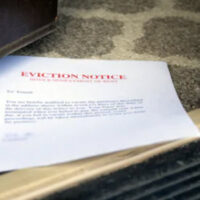Bankruptcy And Evictions

If you file for bankruptcy and you rent property, there are things you should know about how the bankruptcy will affect your rental agreement. Many consumers are afraid that their landlord will retaliate against them if their landlord gets notice of the bankruptcy, but in fact, this is unlikely to happen.
Your landlord is considered a creditor, and is also holding your property in the form of a security deposit. That means that your landlord must be notified of your bankruptcy, even if you don’t actually owe any money (that is, you aren’t behind on payments) at the time that you file your case.
Stopping Evictions
Some people file for bankruptcy for reasons other than being behind on rent, or fearing eviction. But if you are filing for bankruptcy in order to avoid eviction, bankruptcy can help you.
When you file your bankruptcy the automatic stay goes into effect. This is an automatic and immediate hold on any collections actions against you. That includes proceeding with eviction actions (or foreclosure, for homeowners).
However, the automatic stay won’t protect you if the landlord has already gotten a judgment of eviction. That means that if you are facing eviction, you need to act fast in getting your bankruptcy filed. Once the eviction judgment is entered, you can still have any money you owe discharged, but you won’t be able to stop the eviction for any meaningful amount of time the way you would if you’d filed the bankruptcy before a final judgment of eviction is entered.
Bankruptcy law does allow the landlord to proceed with eviction even after you’ve filed for bankruptcy, if you do not make payments that become due and owing after your filing. In other words, you must continue to pay your regular rent after you file your bankruptcy case.
Back Rent
Bankruptcy law does require that you pay back owed rent within 60 days. However, you may want to just leave the property now that you have this extra time. If you choose to leave—that is, you choose to reject the lease—you can do so, and once the discharge is entered you will not owe the landlord any money.
Chapter 13 and Eviction
In Chapter 13 bankruptcy, if you are current on your lease, there is nothing different—you will continue to pay your rent, outside of the plan payments (that is, pay your landlord directly, as you always have).
However, if you do owe past rent, you’ll have to pay both the past rent and your current rent in the plan (to the trustee). Because a typical Chapter 13 plan is 3-5 years, Chapter 13 provides a flexible schedule to repay back rent at a manageable amount and remain in the property, so long as you are current with your ongoing plan payments.
Call the West Palm Beach bankruptcy lawyers at Kelley Kaplan & Eller at 561-264-6850 for help if you are facing eviction or foreclosure. Bankruptcy may have options to help you in both situations.



